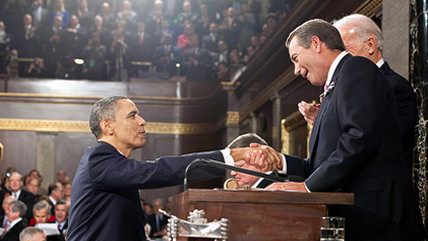Shut It All Down

As congressional Republicans and Democrats squabbled over budget deficits and government shutdowns in Clinton-era Washington, Contributing Editor Carolyn Lochhead took both sides to task. In "Child's Play" (February 1996), Lochhead wrote "Republicans say they will save America's children, while Clinton claims that he will save America's values." Both, according to Lochhead, were wrong.
"Even if the two sides agree on an honest seven-year plan [to balance the budget] before the 1996 election," she wrote, "it will represent at best only a modest step toward forestalling a problem that will leave American children and American values alike wrecked on the shoals of today's potent elderly voting bloc." The Republican proposal would lead to a balanced budget in the near term, but it would leave the country's long-term finances in deep trouble, starting around 2010. "That's when the 76 million-strong baby boom generation begins to retire and sign up for benefits in the big entitlement programs that now drive the federal budget: Social Security, Medicare, Medicaid, and civil service and military retirement."
In October 2013, fiscal disputes in Congress once again led to a shutdown showdown. The proximate cause for the impasse was a Republican charge to defund the Affordable Care Act, a.k.a. ObamaCare, but it arrived against the backdrop of worsening federal entitlement finances.
The 2013 Social Security Trustees report found an unfunded liability of $23.1 trillion-almost twice the total federal debt. And in August the Congressional Budget Office's long-term fiscal outlook warned that America's federal finances were on an unsustainable path. Rising spending on entitlements, particularly health entitlements, were the largest problem area.
Looming entitlement shortfalls are both "substantial" and "quite certain," the entitlements' trustees wrote, and "elected officials will best serve the interests of the public if financial corrections are enacted at the earliest practicable time."
Despite the shutdown, few significant fixes were forthcoming. A laundry list of Republican demands barely broached the subject, and even a proposal by Rep. Paul Ryan (R-Wis.), the chairman of the House Budget Committee, to alter Medicare financing would only have tinkered around the edges. Indeed, GOP legislators seemed unable to decide what they wanted out of the conflict. "We have to get something out of this," Republican Rep. Marlin Stutzman of Indiana said. "And I don't know what that even is."


Show Comments (5)